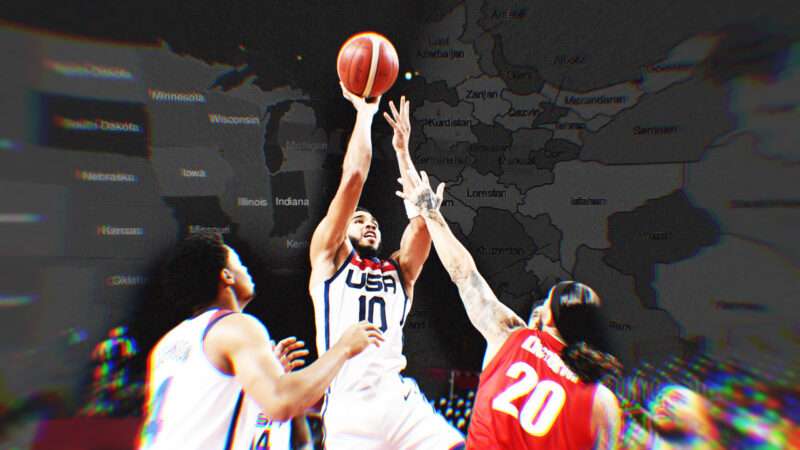
The United States and Iran met today at the Tokyo Olympics to play basketball. The elephant in the room—decades of geopolitical saber-rattling and proxy violence—was nowhere to be seen. The Americans clapped as the Iranian national anthem played. The Iranians applauded “The Star-Spangled Banner.” Handshakes and niceties were exchanged before and after the game.
It was a match between opponents, not enemies. Historical relations between the U.S. and Iran might make that goodwill seem staggering—but today’s game perfectly highlights the difference in how governments interact and how normal people do.
The story of U.S.-Iran hostility features one debacle after another. There was the 1953 Operation Ajax, in which the U.S. overthrew Iran’s democratically elected Prime Minister Mohammad Mosaddegh; then, the 1979 Iranian hostage crisis and attack on the U.S. Embassy in Tehran. The two countries officially cut diplomatic ties in April 1980. President George W. Bush dubbed Iran part of the “Axis of Evil” in 2002; the U.S. has long been the “Great Satan” to Iran. Recent years have been filled with attacks, threats, and vitriol.
But there have been glimmers of rapprochement, and sports have brought some of that hope. In February 1998, the U.S. sent wrestlers to a contest in Tehran, the first time American athletes had traveled to Iran since the 1979 embassy attack. The event made the front page of the English-language Tehran Times. Iranian audience members “whistled in appreciation” as the wrestlers competed. Viewers cheered even as American Shawn Charles beat Iran’s Mahdy Kaveh.
Just two months later, Iran sent its own wrestlers to a competition in Stillwater, Oklahoma. Rep. Robert W. Ney (R–Ohio) delivered congratulatory welcoming remarks, to great fanfare from the Iranians in the crowd. As the competition drew to a close, Iranian Wrestling Federation President Mohammad Taleghani announced on the arena floor that “he looked forward to the day when they could all attend a wrestling match in Iran.”
The positivity built up during these citizen exchanges helped spark open dialogue among government officials. Secretary Madeleine Albright and Iranian Deputy Foreign Minister Mohammad Javad Zarif met later that year in the highest-level diplomatic contact between the two nations since the hostage crisis. The U.S. even lifted a few sanctions.
Progress would eventually stall. But the chance of reconciliation was there, and wrestling played a critical role in easing tensions.
Sports have long built bridges where governments have struggled. Perhaps the most famous example was the “pingpong diplomacy” of the 1970s, when the United States and China exchanged table tennis players. The athletic event famously gave way to President Richard Nixon’s visit to Beijing in 1972—a turning point for Sino-American relations. The tactic would be used again in the 1999 Baltimore Orioles–Cuba national baseball team exhibition series, and once more in the U.S. and Iran’s 1998 World Cup match. Of that exchange, American defender Jeff Agoos said, “We did more in 90 minutes than the politicians did in 20 years.”
Today’s basketball game likely won’t be the turning point in U.S.-Iran relations. But with the two nations now uneasily renegotiating the terms of a nuclear deal, people-to-people interactions like these can’t be undervalued. Though the efforts of private citizens can’t produce a treaty or reopen an embassy, engaging peacefully with someone who history says you should hate is no small task.
It’s often been normal people interacting with normal people—and not high-level political exchanges—that highlight what’s possible for brutally opposed countries. By no means do the harsh rhetoric, sanctions, and tit-for-tat regional violence volleyed between the U.S. and Iran represent what citizens in those two countries want. U.S. basketball coach Gregg Popovich was right to lament today, “The Olympics, this is a venue where sports transcends all that petty crap between governments….We just wish this happened in real life.”
But isn’t this real life? Showcases like the Olympics are entertaining, but their true importance lies in showing how different people can and do unite around common pursuits. Even citizens of nations as antagonistic as the U.S. and Iran share the same desires and aspirations, regardless of the way their governments grapple. Without these athletic arenas, where could representatives of the fiercest enemies hang up their differences, agree to put aside decades of political hostility, and just play ball?
from Latest – Reason.com https://ift.tt/3i9U9rl
via IFTTT